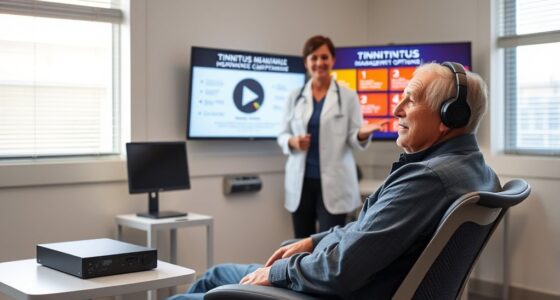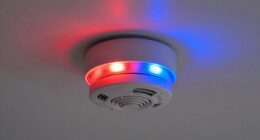While the idea of using self-assessment tools may seem daunting, our survey offers a simple and effective way to evaluate your hearing and tinnitus concerns.
As we navigate the intricacies of these common conditions, it becomes crucial to understand how they impact our daily lives.
This questionnaire serves as a starting point, prompting reflection on symptoms and their implications.
By taking this initial step, individuals can gain valuable insights into their auditory health, paving the way for informed decisions and potential solutions.
Key Takeaways
- Self-assessment tools aid in evaluating hearing loss and tinnitus symptoms accurately.
- Tinnitus impacts daily life, requiring effective management strategies.
- Seeking professional help, including audiologists, is crucial for tailored management plans.
- Regular use of self-assessment tools empowers proactive steps for better hearing care.
Importance of Self-Assessment Tools
Utilizing self-assessment tools is essential for individuals to evaluate their symptoms related to hearing loss and tinnitus accurately. These tools serve as a valuable initial step in assessing one's hearing health before seeking professional evaluation. By answering questions about sound perception, hearing difficulties, daily life impact, and family history of hearing issues, individuals can gain insights into potential hearing concerns. A single positive response in a self-assessment questionnaire may indicate the presence of hearing loss or tinnitus, highlighting the importance of further evaluation by a specialist.
Regular use of self-assessment tools enables individuals to monitor changes in their hearing status over time, empowering them to address any emerging issues promptly. These questionnaires offer a convenient and accessible means for individuals to take proactive steps towards better hearing care. By incorporating self-assessment tools into their routine, individuals can stay vigilant about their hearing health and make informed decisions regarding hearing evaluation and management.
Common Signs of Hearing Loss

An understanding of common signs of hearing loss is crucial for recognizing potential auditory challenges early on and seeking appropriate intervention. Here are some key signs to look out for:
- Difficulty understanding speech, especially in noisy environments.
- Asking others to repeat themselves frequently.
- Turning up the volume on electronic devices beyond what others find comfortable.
- Experiencing ringing in the ears, known as tinnitus.
These signs can manifest gradually, leading to missed sounds like doorbells or alarms, or suddenly after exposure to loud noises. Individuals with hearing loss may also struggle in social settings, feel isolated, and face challenges with phone conversations.
Recognizing these signs early and seeking professional help is essential to prevent further deterioration and improve overall quality of life. By being aware of these common signs, individuals can take proactive steps towards addressing potential hearing loss issues.
Impact of Tinnitus on Daily Life
Recognizing the impact of tinnitus on daily life is essential as it can significantly disrupt concentration, sleep quality, and emotional well-being. Individuals experiencing tinnitus may find it challenging to focus on tasks, leading to difficulty hearing and understanding conversations. This can result in heightened stress, anxiety, and irritability due to the persistent phantom sounds they hear.
Social interactions and work performance may also be affected, impacting overall quality of life. Sleep disturbances caused by tinnitus can further exacerbate these issues, leading to fatigue, mood changes, and decreased productivity during the day. However, effective tinnitus management strategies exist to help mitigate these challenges.
Steps to Take After Assessment

After undergoing a comprehensive assessment for hearing loss and tinnitus, we're ready to outline the necessary steps to effectively manage these conditions and improve our quality of life.
- Consider Hearing Aid: If recommended by your healthcare provider, using a hearing aid can help manage tinnitus by enhancing external sounds, reducing the perception of ringing or buzzing.
- Consult Audiologists: Seek guidance from audiologists specializing in tinnitus for personalized management plans and expert advice on coping strategies.
- Explore Comprehensive Evaluation: Opt for a thorough examination to identify the root cause of your hearing loss and tinnitus, enabling tailored treatment options.
- Try Tinnitus Retraining Therapy: Explore this therapeutic approach focused on habituation and sound enrichment to minimize the impact of tinnitus on your daily life.
Seeking Professional Help
Seeking professional help from experienced audiologists is essential for effectively managing tinnitus and improving your quality of life. Audiologists at Echo Hearing Center specialize in tinnitus management, providing expert support and personalized care.
By collaborating with audiologists, individuals can benefit from tailored tinnitus management plans that address their specific needs and the severity of their condition. It's crucial to seek professional help for effective tinnitus management and symptom reduction.
Taking charge of tinnitus begins with contacting audiologists for a comprehensive evaluation and exploring suitable treatment options. Expert assistance from audiologists can offer the necessary support and guidance to effectively manage tinnitus symptoms.
Frequently Asked Questions
How I Cured My Tinnitus Home Remedies?
We found relief from tinnitus through sound therapy, relaxation techniques, and stress management. Herbal supplements like ginkgo biloba or melatonin also helped some of us. Alternative approaches such as cognitive behavioral therapy (CBT) and acupuncture have been effective for others.
Maintaining a healthy lifestyle with regular exercise, a balanced diet, and adequate sleep can also contribute to managing tinnitus. It's crucial to consult with a healthcare provider before trying any home remedies for tinnitus for safety and effectiveness.
What Are the 4 Types of Hearing Loss?
There are four main types of hearing loss:
- Conductive hearing loss affects the outer or middle ear, hindering sound conduction.
- Sensorineural loss results from inner ear or nerve damage, disrupting sound signal transmission.
- Mixed hearing loss combines aspects of both conductive and sensorineural issues.
- Central hearing loss involves challenges with processing sound signals in the brain, impacting speech and sound comprehension.
What Is the Best Cure for Tinnitus?
When it comes to tinnitus, it's important to understand that there isn't a one-size-fits-all cure. However, various management strategies can help ease symptoms and enhance quality of life.
Common treatments include sound therapy, counseling, relaxation techniques, and hearing aids. Additionally, cognitive behavioral therapy (CBT) and mindfulness-based stress reduction (MBSR) have proven effective in managing tinnitus distress.
Some individuals also find relief through alternative treatments like acupuncture, hypnotherapy, or dietary adjustments. Ongoing research explores new treatments such as neuromodulation, medication trials, and innovative sound-based therapies.
How Can I Test Myself for Tinnitus?
When testing for tinnitus, we first recommend paying attention to any persistent ringing or buzzing sounds in your ears. Keeping track of how often these noises occur and whether they impact your daily activities can provide valuable insights.
It's vital to note any factors that seem to worsen or alleviate the symptoms. Consulting with a healthcare professional for a comprehensive evaluation is crucial for effective management and support.
Conclusion
In conclusion, self-assessment tools like the questionnaire provided can serve as valuable resources in understanding and managing hearing loss and tinnitus.
As the saying goes, 'knowledge is power,' and by taking proactive steps to assess our symptoms and seek professional help, we can empower ourselves to make informed decisions about our hearing health.
Remember, early intervention and collaboration with audiologists can lead to personalized management plans that improve our quality of life.










